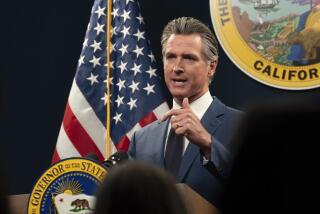Obama begins rollout of budget certain to spark strong debate
Reporting from Washington â President Obama began the official rollout of his new budget proposal Monday morning with a visit to a math and science magnet school, pointing to such public-education programs as the kind in which the federal government should invest more money.
Education investment is an area where heâll likely find agreement among Democrats and Republicans, but Obama is delivering a budget on Monday that contains an array of spending choices certain to set off a vigorous debate about priorities.
At Baltimoreâs Parkville Middle School and Center of Technology, Obama attempted to begin that discussion on favorable ground, with an argument about the importance of preparing American students for math and science careers. Cutting spending is important, but âwe canât sacrifice our future in the process,â Obama said. âWe have a responsibility to invest in those areas that will have a big impact.â
Obama is laying out a budget proposal Monday that would cut the federal deficit by $1.1 trillion over the next 10 years. His spending plan for the next fiscal year is $90 billion smaller than the one he proposed last year.
By showing a willingness to cut spending, including to programs it supports, the administration hopes to turn the fight over spending to a comparison of the programs in which he and Republicans want to invest.
Republicans were immediately critical of the basic outline as the presidentâs Office of Management and Budget began to unveil it.
âHis budget reads more like a blueprint for losing the future,â said Sen. Jeff Sessions (R-Ala.), chairman of the Senate Budget Committee, putting a spin on the White Houseâs new slogan. âIt puts us on the road to decline. It simply spends, taxes and borrows too much.â
Key House Republicans believe the spending blueprint wonât cut the budget nearly enough to satisfy them. House Speaker John Boehner (R-Ohio) has already been dismissive of Obamaâs proposed five-year freeze on discretionary spending, because it was preceded by two budgets with large spending increases. He objects to locking in those levels of spending, he says.
Shortly after the budget proposal was released, Boehner sent out a statement complaining that it would not create jobs as Obama said it would.
âThe presidentâs budget will destroy jobs by spending too much, taxing too much and borrowing too much,â he said. âBy continuing the spending binge and imposing massive tax hikes on families and small businesses, it will fuel more economic uncertainty and make it harder to create new jobs.â
In Obamaâs words, though, his spending choices are âinvestmentsâ in the American economy.
Schools like Parkville offer the kind of education the U.S. needs to expand, Obama said, âso that every American is equipped to compete with any worker, anywhere in the world.â Education is an âessential partâ of the budget he is proposing, he said.
âEngineering and math, critical thinking, problem solving,â Obama said. âThese are the kinds of subjects and skills our children need.â
In the budget document being delivered Monday morning, Obama proposes to shrink the deficit from an estimated 7% of gross domestic product this year to 3.2% in 2015, maintaining it at roughly that level through 2021.
Not all of the deficit reduction is in the form of spending cuts. Obama also is proposing an end to tax breaks enacted under former President George W. Bush for the nationâs wealthiest earners.
About two-thirds of the deficit reduction over 10 years would come from cuts. The rest would come from revenue increases.
The proposed budget includes a five-year freeze on non-national security discretionary spending, which would save $400 billion, and the elimination or trimming of dozens of programs.
Obama is proposing cuts in the amount of $2.5 billion in heating assistance for low-income people, at least $1 billion in grants to large airports and $300 million from Community Development Block Grants, a program popular with local government officials nationwide.
The budget plan also would trim $78 billion from Pentagon spending over the next five years, eliminating purchases of additional transport planes and development of a Marine vehicle and engine for the Joint Strike fighter. Those cuts mirror recommendations by Defense Secretary Robert Gates.
Also on the chopping block are a dozen tax breaks to oil, gas and coal producers worth $46 billion over 10 years. Though headlining the need to make painful cuts, officials insisted that selective budget boosts for education and infrastructure also were necessary.
The administration plans to expand Pell grants for college students but would finance it through a $100-billion package of savings that could make it harder for some students to finance their education. The changes would eliminate the availability of the grants for summer- term students and increase the costs of graduate-school loans by having interest begin to accrue while students are in still in school, rather than after they graduate.
Officials also said the budget would include funding to bring high-speed Internet access to 98% of Americans and prepare for 100,000 new science and math teachers, but they offered few details on timing or financing.
The budget also would give tax breaks for investment and employment in 20 economically hard-hit areas of the country. Obama seeks to solve, for now at least, some of the nationâs more difficult budget problems. For instance, the budget would exempt many higher earners from the Alternative Minimum Tax for three years but would do so by limiting tax deductions for those earning even more.
It also includes a two-year fix for the problems of Medicare reimbursements to physicians to head off a nearly 30% cut in payments, a problem Congress has been forced to solve by spending taxpayersâ money each year.
[email protected]
[email protected]
More to Read
Get the L.A. Times Politics newsletter
Deeply reported insights into legislation, politics and policy from Sacramento, Washington and beyond. In your inbox three times per week.
You may occasionally receive promotional content from the Los Angeles Times.











